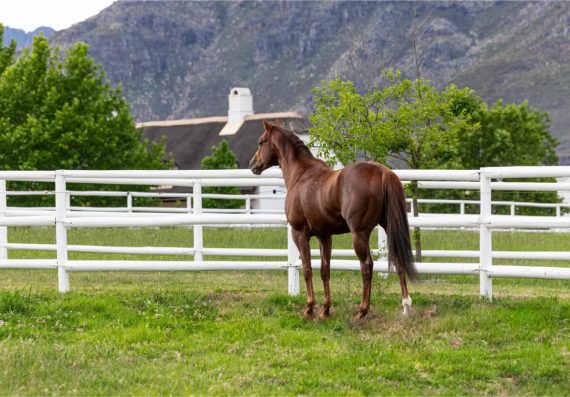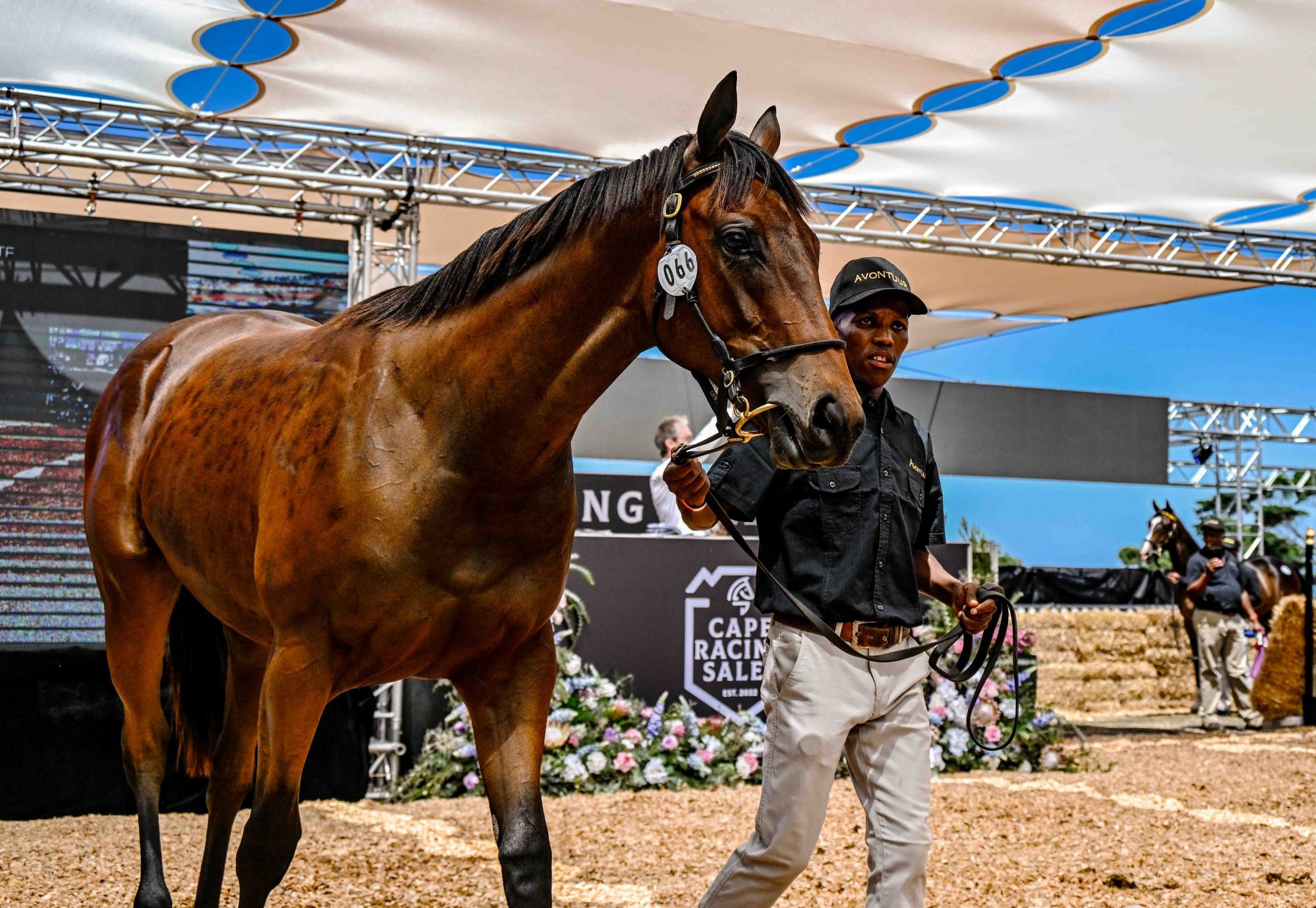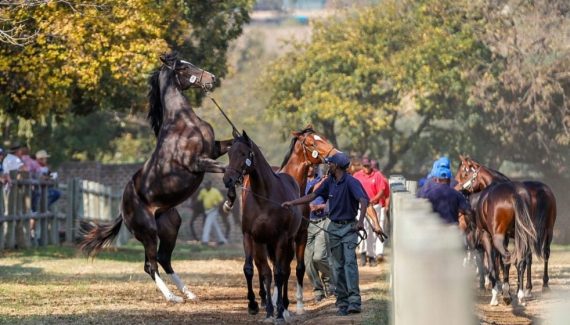The World Pool Gr3 Gold Cup may have lost its Gr1 status in 2016, yet the 3200m marathon race is still regarded as the most popular event on ‘Gold Cup’ day, notwithstanding the fact that it has to compete with four Gr1 races on the programme.
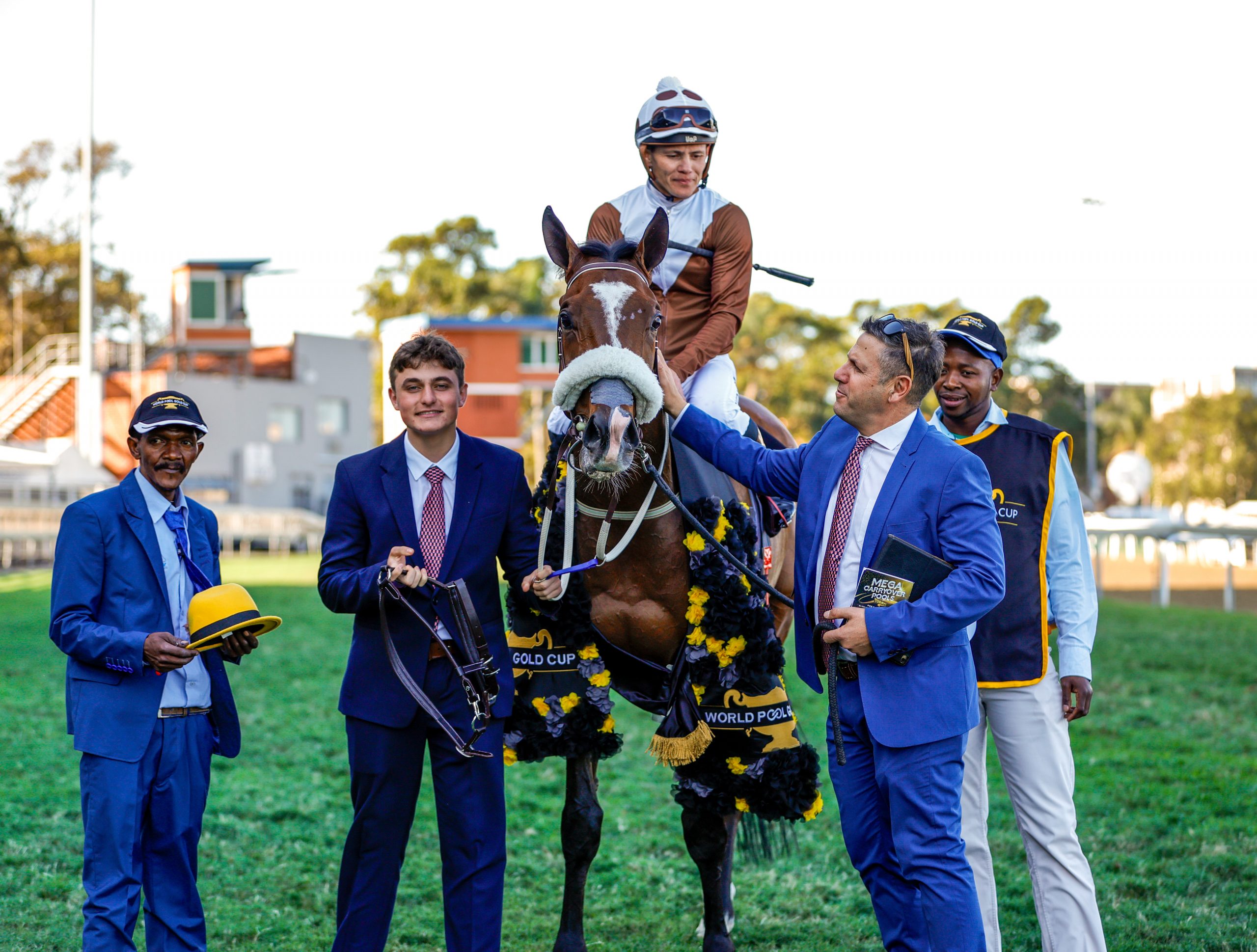
Sean and Daniel Tarry and the Randjesfontein team lead Future Pearl (Richard Fourie) in after his Gold Cup victory last year (Pic – Candiese Lenferna)
This year marks the 104th renewal of South Africa’s premier long distance race and the question on many lips is, can last year’s winner Future Pearl go back to back?
Sean Tarry’s charge takes up his title defence off a fine run in the Gr1 Hollywoodbets Durban July where he ran on to finish just two lengths behind the winner.
Before that, he stormed to a fluent victory in the Gr3 Tabgold Derby, so prep wise, he should be razor sharp come Sunday.
For those not in the know, the last horse to complete the double was Highland Night back in 2003.
In days gone by, the marathon race invariably went the way of the light weights. To think that 1971 winner Rainstorm was partnered by Michael Roberts under 45 kg, a featherweight unheard of in this day and age.
The highest-weighted winner is It’s My Turn, who defied a 59,5 kg impost to claim the 2018 race. Future Pearl is one of three contenders who has been assigned that same mass, half a kilo less than top weight Zeus.
Remarkably, there has only been one Gold Cup deadheat in the modern era, when Pacer and Don The Stripe shared the honours in 1977.
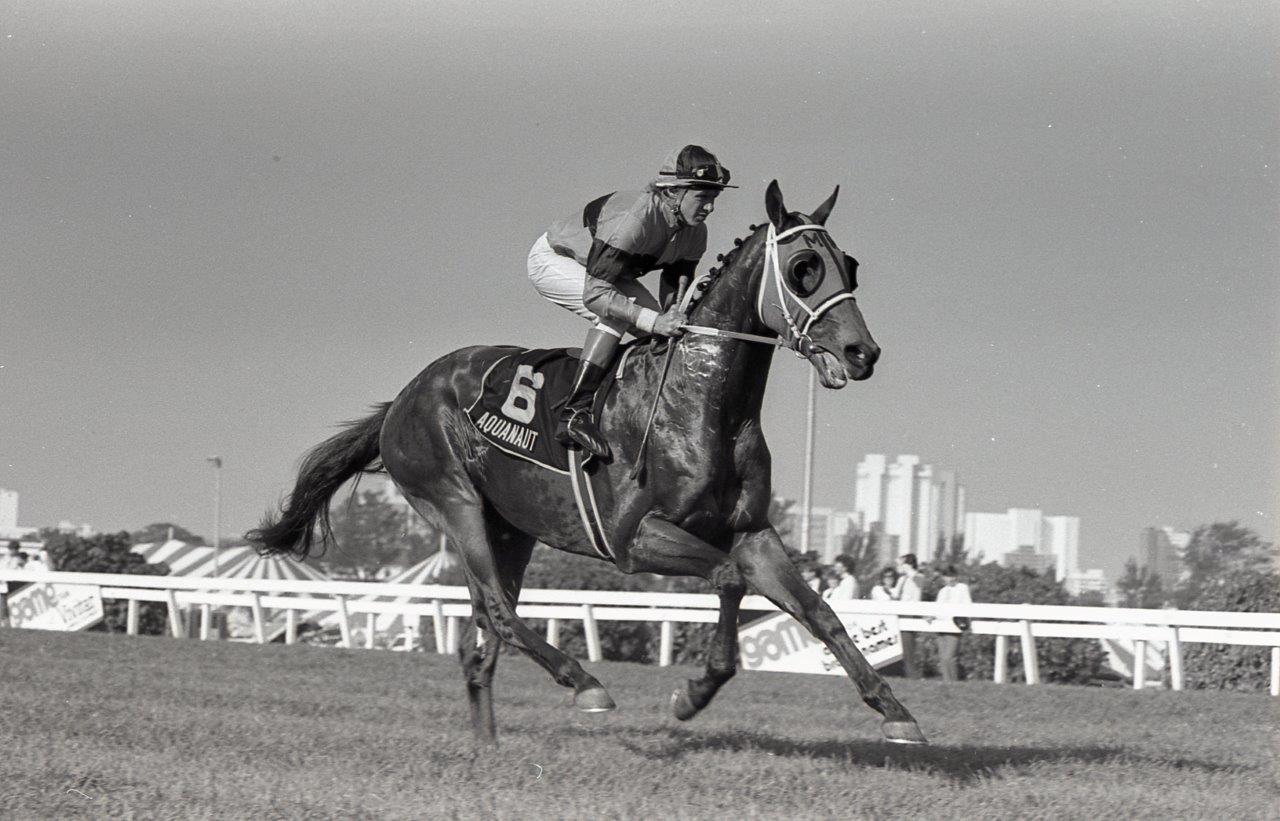
Aquanaut canters to post for the 1987 Game Gr1 Gold Cup (Pic – Supplied)
From a breeding perspective, very few stallions have won the marathon event, for the simple reason that stayers are shunned by breeders, and very few entires contest the race.
The last entire to win the race was Tropicante in 1989, the season he was named the country’s Champion Stayer. Trained by Ralph Rixon, this Argentinian-bred had been beaten a neck by Right Prerogative in the rain-softened Durban July. As a stallion, he proved an abject failure.
Two winners who did enjoy a degree of success at stud were Speciality (1962) and Jerez (1963). The former, a Birch-bred owned and trained by Basil Cooper, was a moderate two-year-old but showed potential when he ran second in the SA Derby.
Maturity brought out the best in the horse at age five when he ran second to Colorado King in the Durban July, with Jerez in third, before winning the Gold Cup in a new record time. Runner-up in the Metropolitan at six, he went one better to win the Cape showpiece race at age seven.
As a stallion, Speciality had the distinction of siring the popular galloper The Malster, who emulated his sire when victorious in the 1979 Gold Cup at the similarly advanced age of seven.
Like his sire, he was owned and trained by Cooper and will forever be remembered as the horse the legendary Lester Piggott piloted to an unheard-of victory at Hollywoodbets Scottsville.
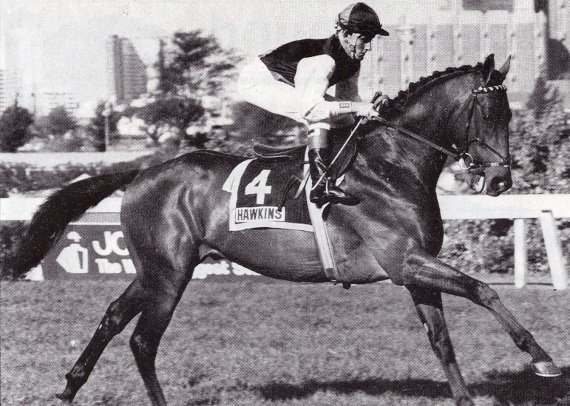
Hawkins canters down in 1983 (Pic – Supplied)
For all his skill and strength, Piggott was unable to get The Maltster to jump on terms with his rivals and when he eventually left the starting stalls, he was some 20 lengths adrift.
From that hopeless position, Piggott went to work on the horse and the packed Scottsville crowd watched in disbelief as the black, gold and white silks caught up, knifed through the field and won going away.
In a book written a few years later, top jockeys were asked to recall their finest rides and Piggott singled out that day in Maritzburg.
For the record, Speciality also made his mark as the broodmare sire, notably of the fine siblings Macheath and Witchita.
The former, a son of Royal Affair, won the Gr2 Merchants Cup, whilst his Mexico II half-sister Witchita put together a juvenile campaign worthy of championship honours by defeating colts in the Gr2 Cape of Good Hope Nursery, won the Gr.3 Strelitzia Stakes and finished second in the Gr1 Allan Robertson.
Jerez, bred by the Kosters, proved himself wonderfully durable, winning 14 races in a career spanning five seasons. Successful in the Cape Guineas and runner-up in the Cape Derby, he won the Metropolitan at four, the Champion Stakes at five and capped his career with a fluent length victory in the Gold Cup as a newly-turned six-year-old.
He returned to his birthplace Klavervlei Stud for stallion duties and counts amongst his best progeny the Gr1 winning sprinter Pyrmont, the multiple Gr1-placed stakes winner Aegean and the fine stayer Samothrace.
Unlike Speciality, he never sired a Gold Cup winner, but features as the broodmare sire of 1980 Gold Cup hero Furious. Owned by Cyril Hurvitz, he was trained by the late Annie Upton, who to this day, remains the only lady trainer of a Gold Cup winner!
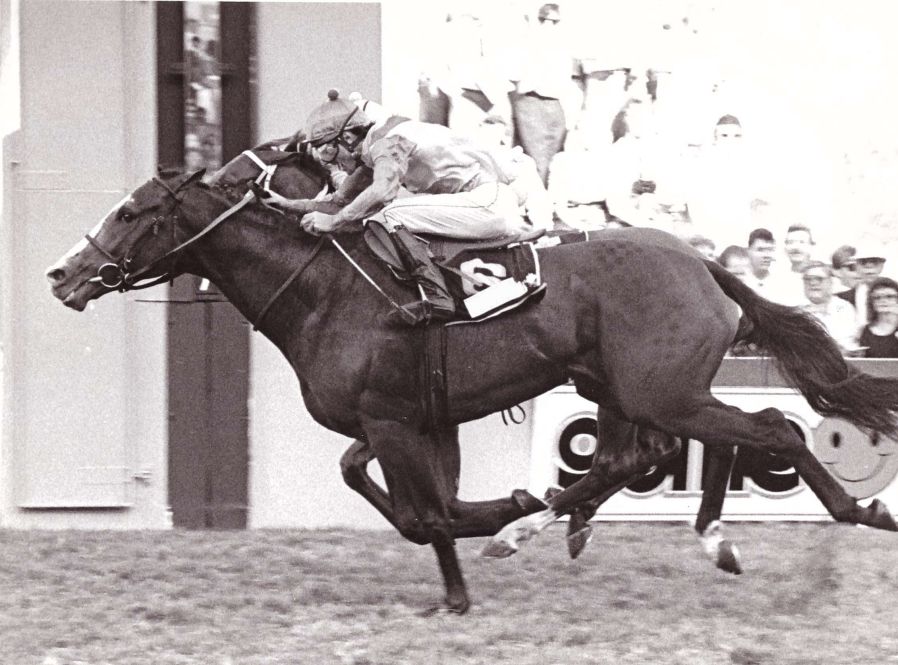
Tropicante wins the 1989 Gold Cup (Pic – Supplied)
Incidentally, just one broodmare has ever produced more than one Gold Cup winner. This unique achievement belongs to Fauvette, an unraced mare whose liaisons with the stoutly-bred St Cuthbert became the stuff of dreams.
She produced four stakes winners to the son of Herbager, two of which would win the country’s premier staying event.
In 1978, the Tony Furness-trained Fauvist defied his 33-1 odds to cause the upset and six years later in 1983, his Terrance Millard-trained full brother Hawkins ran out a comfortable winner under Mark Sutherland.
He had been beaten a neck when second the previous year, a feat he repeated in 1984 when he chased home stable companion Devon Air.
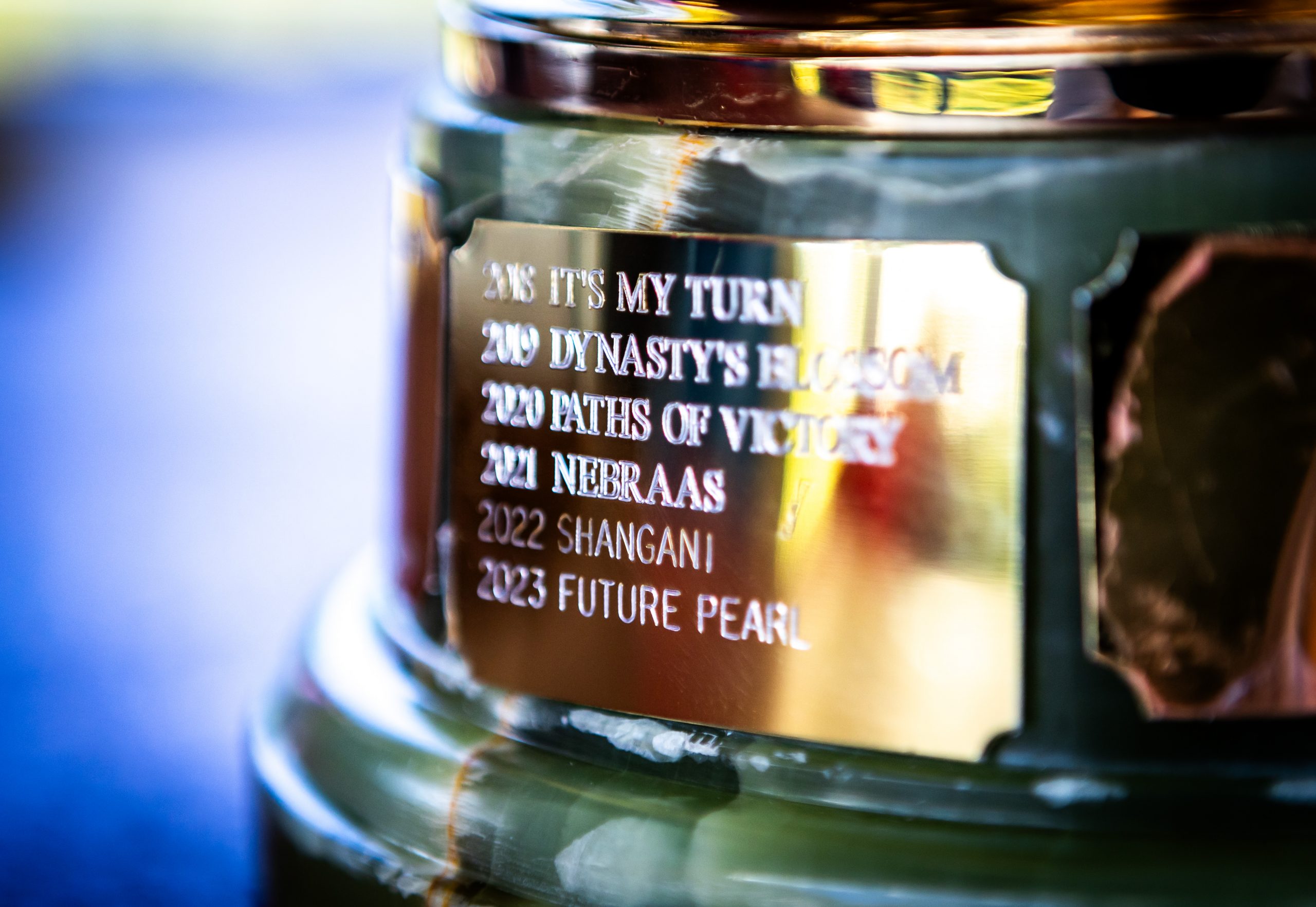
The magnificent trophy (Pic – Candiese Lenferna)
Full brother Rouge Gorge also proved a fine stayer and emulated Fauvist by winning the 3000m Diogenes Handicap, now the Gr2 Gold Vase. For the record, Hawkins twice won the Gr2 Gold Vase when it was contested at Clairwood.
Incidentally, in recent years the Windrush mare Lil’Bacio has come close, her sons Paybackthemoney and Out Of Your League finishing second and third respectively in 2020 and 2021.
This year, she will be represented by aforementioned Zeus.
We live in uncertain times and who knows, with the continual decline in the popularity of stayers, the Gold Cup may yet face another downgrade.
Whatever its fate, as a visual spectacle it remains a firm crowd favourite and a highlight of what is a fitting finale to the racing season.







